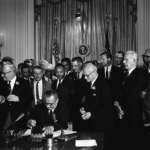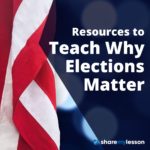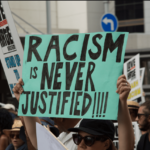When most people think of the Civil Rights Movement in America, they think of Martin Luther King, Jr. delivering his “I Have a Dream” speech on the steps of the Lincoln Memorial in 1963 and receiving the Nobel Peace Prize the following year. But “the Movement” achieved its greatest results — the 1964 Civil Rights Act and the 1965 Voting Rights Act — due to the competing strategies and agendas of diverse individuals. Even black Americans, the primary beneficiaries of this landmark legislation, did not agree on the tactics that should be used to secure the equal protection of their rights. This unit presents the views of several important black leaders who shaped the debate over how to achieve freedom and equality in a nation that had long denied a portion of the American citizenry the full protection of their rights.
Documents and Debates in American History and Government – Vol. 2, 1865-2009
The Core Documents Collection – Documents and Debates is structured around a series of topics, each based on a question for debate. For each topic, there is a collection of documents that, together, form the basis of argument over that topic – from those who debated it at a given point in American history. Volume One covers 1865-2009.
The goal is to explore a series of critical moments in American history by asking questions for which there are not simple yes/no answers, but instead call for informed discussion and rational debate. The Documents and Debates readers also include appendices of additional documents, and together are a perfect fit for any American History survey course, including AP U.S. History.
The 1964 Civil Rights Act: Lesson Plans and Resources

On July 2, 1964, President Lyndon B. Johnson signed the Civil Rights Act into law. Originally proposed by President Kennedy in 1963, this landmark piece of legislation made discrimination based on race, religion, sex or national origin illegal. Additionally, the Civil Rights Act ended the practice of unequal voter requirements based on race or sex and ended racial segregation in schools. The Share My Lesson team has curated a collection of free lesson plans, activities, and classroom materials for educators to use in teaching students about the Civil Rights Act.
Women & the American Story: A Nation Divided, 1832-1877
This free curriculum unit from the New-York Historical Society delves into the ways women participated in all aspects of the Civil War and on both sides of the conflict, from the early debate over the expansion of slavery through the end of federal Reconstruction. Materials examine this pivotal moment in American history through the experiences of diverse women and consider how the war and then Reconstruction policies shaped their lives.
Civic Education and Election Resources

It’s election season in the United States and a good time for students to understand why local and national politics matter and the core principles on how our democracy and elections works. What is gerrymandering? How can we strengthen our democracy? Plan how to answer questions like these as Election Day draws closer. Use these free K-12 civic education lessons, activities, blogs and webinars to help you educate students on the election and the importance of counting every vote. Additional topics include fostering civil discourse, fighting fake news, voting rights and debate ideas to keep your students informed and engaged.
Civic Conversations
How do educators invest in productive, deep, and transformative dialogue in their classrooms? Civic Conversations is a collaboration between the Edward M. Kennedy Institute’s civic education programming and the community-building dialogic structure practiced by Essential Partners. Explore resources, activities, and lesson structures that support educators as they facilitate difficult conversations, create inclusive learning environments, raise complex discussions, and promote a safe space for students to consider their values and engage in their communities. Policy simulations at the Kennedy Institute reflect the wide range of issues that face our country today. Students debate the best way to reform our immigration system, consider the balance between privacy and security, and think about how to meet the challenge of climate change. As in the real Senate, it’s natural that students will disagree on the best approach to many civic issues. This collection of resources will support educators as they prepare to discuss civic issues, either in preparation for a Kennedy Institute field trip or to practice listening, sharing, and learning in the classroom.
Habeas Corpus: The Guantanamo Cases
One of our oldest human rights, habeas corpus safeguards individual freedom by preventing unlawful or arbitrary imprisonment. This documentary examines habeas corpus and the separation of powers in the aftermath of the 9/11 attacks as the Supreme Court tried to strike a balance between the president’s duty to protect the nation and the constitutional protection of civil liberties in four major Guantanamo Bay cases: Hamdi v. Rumsfeld, Rasul v. Bush, Hamdan v. Rumsfeld and Boumediene v. Bush.
Closed captions available in English and Spanish.
Civic Conversations
How do educators invest in productive, deep, and transformative dialogue in their classrooms? Civic Conversations is a collaboration between the Kennedy Institute’s civic education programming and the community-building dialogic structure practiced by Essential Partners. Explore resources, activities, and lesson structures that support educators as they facilitate difficult conversations, create inclusive learning environments, raise complex discussions, and promote a safe space for students to consider their values and engage in their communities.
Second Amendment: D.C. v. Heller and McDonald v. Chicago
The film “Second Amendment: D.C. v. Heller and McDonald v. Chicago” examines the history of guns and gun ownership in our society from the Revolutionary War to modern times and the complicated debate over what the founders intended when they wrote the Second Amendment. Does it protect a right of individuals to keep and bear arms? Or is it a right that can be exercised only through militia organizations like the National Guard?
Teaching About Race and Racism

The Share My Lesson team has curated a collection of free lesson plans and resources to support teachers in educating students about racism and stereotyping. This collection includes resources connected to the events in Charlottesville, VA, in 2017, as well as in-depth activities for students to explore racism, stereotyping, perceptions and bias, as well as racial profiling. These resources can assist in making classrooms safe places for civil discourse.